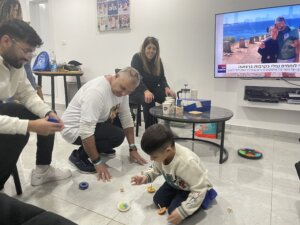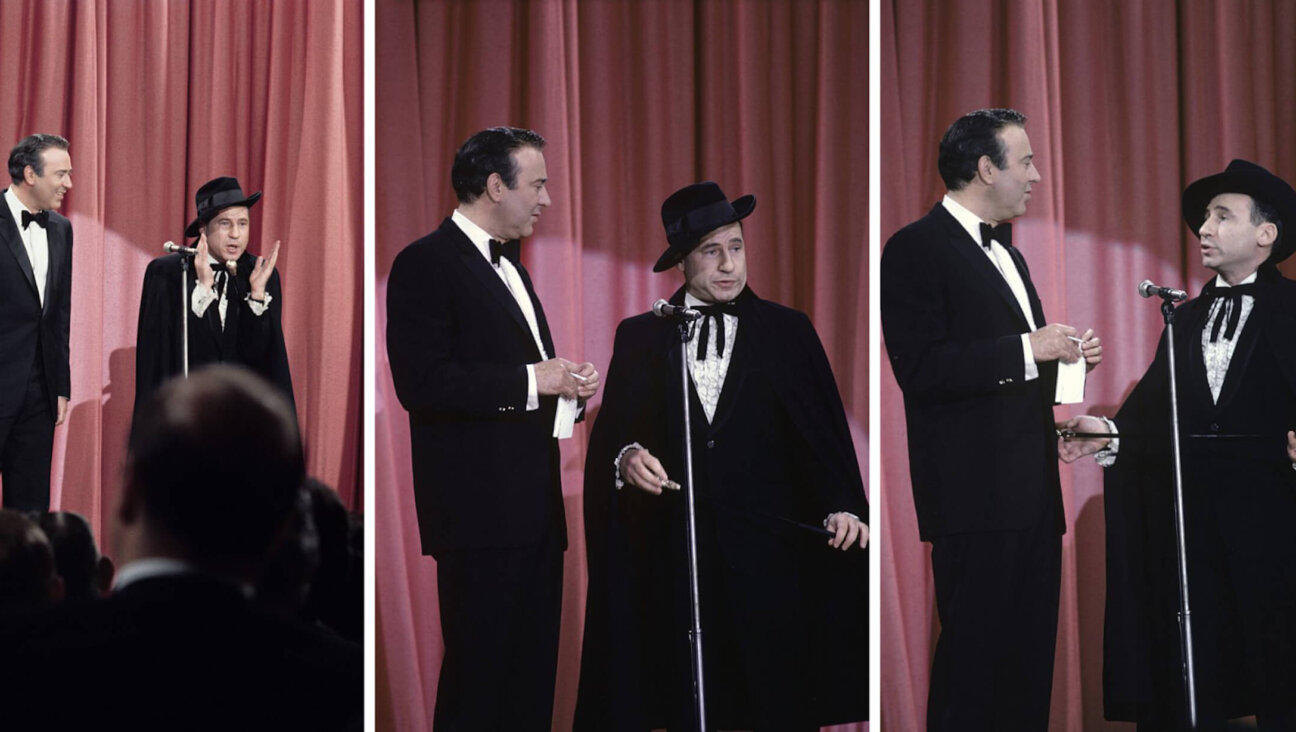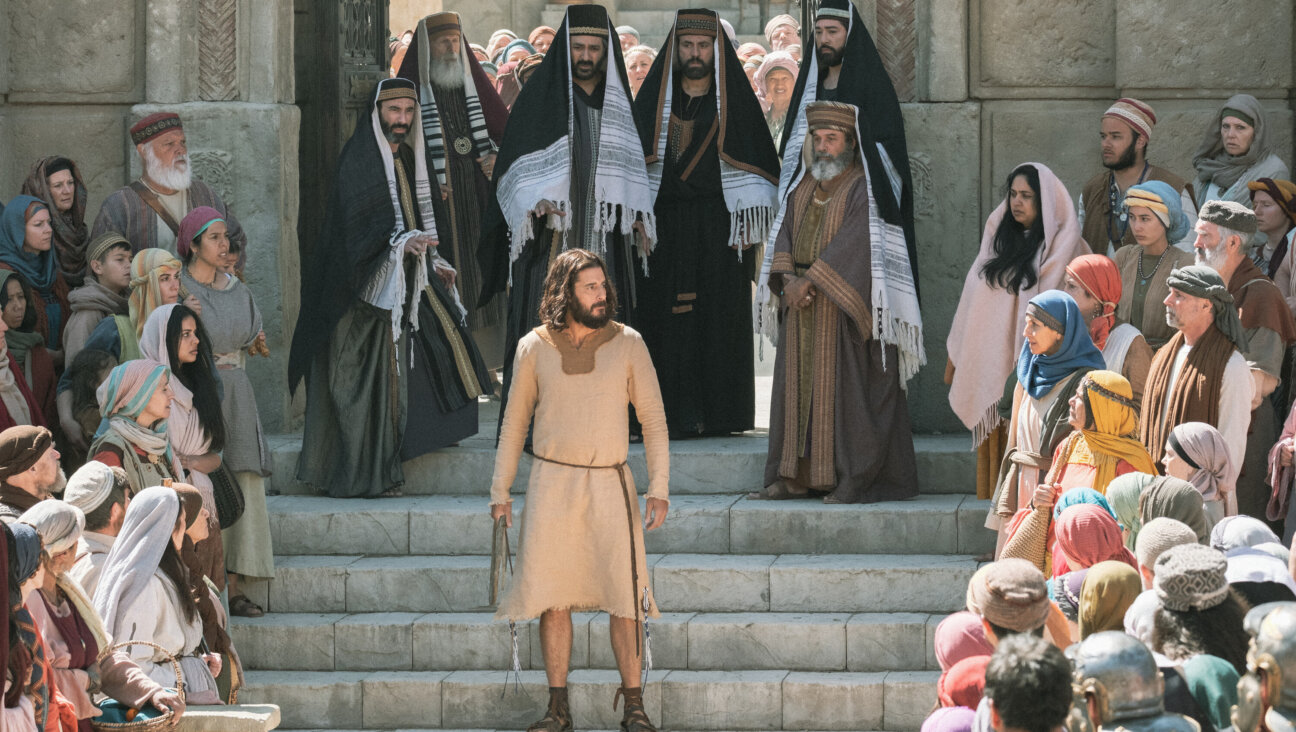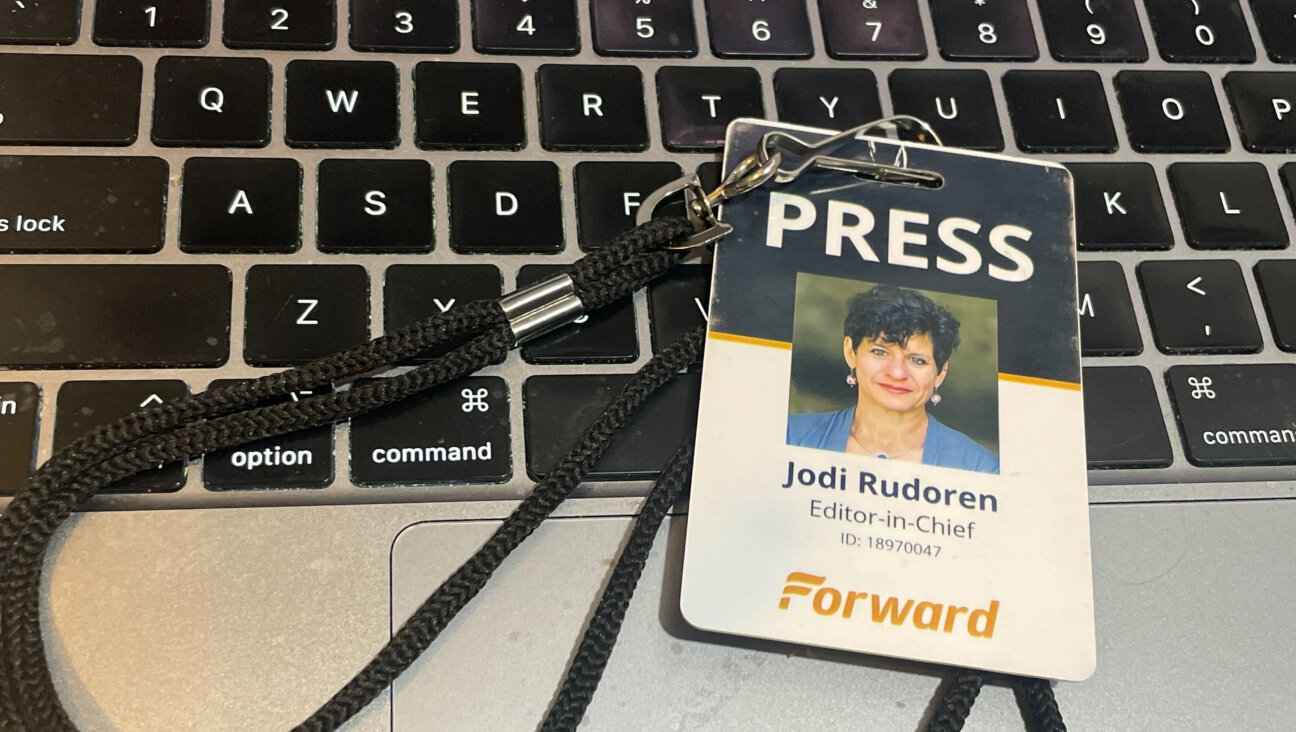‘We need a miracle’: Lighting Hanukkah candles with the family of Israeli hostage Uriel Baruch
With the country at war, celebrating Hanukkah in Israel looks different this year
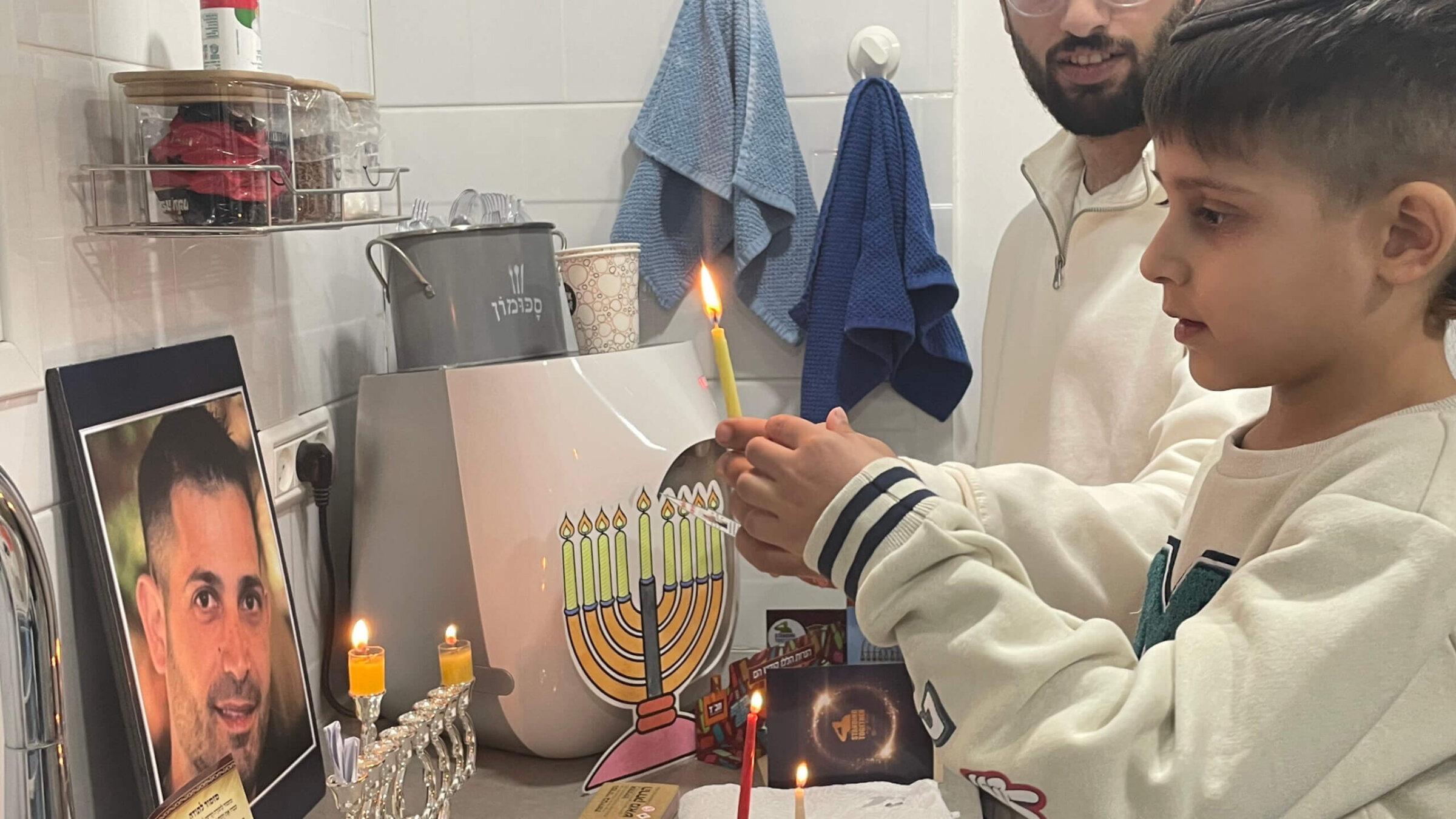
Ofek Baruch, 5, lights the first candle while looking at a photo of his father, Uriel, one of more than 100 Israeli hostages still held in captivity in the Gaza Strip. Photo by Jodi Rudoren
It’s always striking, when celebrating Hanukkah here in Israel, to see the alternate word on the dreidels and hear it in the songs: Nes gadol haya poh, a great miracle happened here — poh, not sham; here, not there; in Israel, where the Maccabees had their great victory, where our history unfolded over millennia.
And now there is new, urgent resonance to the blessing over the Hanukkah candles that describes God as the maker of miracles — nisim, in Hebrew — in the days of our ancestors, it says, and in our own time, bazman hazeh. Especially when you are lighting candles, as I did last night, with the family of one of the 130-some hostages still in captivity inside Gaza, Uriel Baruch.
“Bazman hazeh we need the nisim,” said Dan Anteby, Uriel’s father-in-law. Right now, today, we need the miracles. Amen, amen, amen, amen, amen.
Uriel’s son Ofek, who turned 5 a month ago, lit the first candle in front of a photo of his missing father. “We know he’ll be back,” said Uriel’s wife, Rachel. “We need a miracle. Very big miracle.”
Baruch, as regular readers of this column may remember, is the hostage whose card I was randomly given at a vigil in my hometown of Montclair, New Jersey, four weeks after the Hamas terror attack that launched this awful war. As I wrote back then, a rabbi at the rally urged each of us to treat the card “like a sacred text,” to keep it in a purse or a pocket, to focus on a single individual since the magnitude of the missing makes it hard to absorb.
It made sense to me, so I learned what I could about Uriel in a phone conversation with Anteby. He works in construction and loves music. He went to the Nova festival with a neighbor, who was among the 1,200 people Hamas murdered that morning. He hates the sight of blood and recently invited a woman celebrating her birthday alone in a restaurant to join his table. He has two sons: Ofek, the younger one, is obsessed with the Israeli superstar Noa Kirel.
I thought of Uriel each morning when I recited the Prayer for the Captives. I kept the card with me, and of course brought it along last week as I traveled to Israel, where I hoped to meet Rachel and Ofek.
Then things got a little weird.
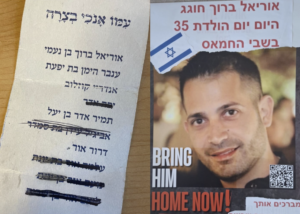
As I walked from my hotel to my favorite Baka coffee shop on my first morning in Jerusalem, I noticed several men ducking into a community center for morning prayers. I followed them, since I’m still saying kaddish for my dad, who died in February.
Like Jewish prayer gatherings around the world, the morning minyan that meets at Baka’s Frankforter senior center has been adding special prayers for the army and the hostages since the start of the war. They pass out bookmark-sized cards with names of a handful of hostages to each attendee, to make the prayers specific.
The first thing I noticed about the card (above, left), was that several of the names had been crossed out — this was the last day of the cease-fire that freed more than 100 of them. Then I looked at the top name on my card: Uriel Baruch.
My husband calls this kind of thing an “it.” It’s bigger than a coincidence; it’s like the world is aligning in some mysterious way to speak directly to you. I shivered a little, said Uriel’s name during the prayer, and tucked the bookmark next to the card with his picture that I already had in my backpack.
Then it got really weird.
I texted the bookmark with Uriel’s name to his father-in-law. He texted back a photo of the hostage poster topped with Hebrew words saying that Uriel was celebrating his 35th birthday in Hamas captivity.
This was Thursday, Nov. 30. Which is my birthday, too.
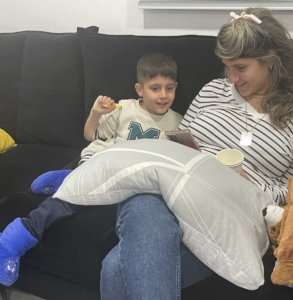
Rachel, who is 32, met Uriel at a party thrown by a mutual friend. They had their first date at Jerusalem’s Machaneh Yehudah market. She works as a hairdresser and a secretary, though not since Oct. 7.
At the Baruchs’ modest apartment in Givat Ze’ev, a West Bank settlement not far from Jerusalem, there are two large photographs placed high on the living room walls: One of Rachel and Uriel at their wedding six years ago, the other of them kissing baby Ofek on the day of his bris. They have been trying to have another child through in-vitro fertilization for three years.
After candle-lighting, we had tea and sufganiyot. The television droned news from Gaza while Ofek, in blue fuzzy slippers, sat on the floor spinning the dreidels I brought him, then drawing a picture of a candle.
“When he sees the picture, he says, ‘This is my father,’ he’s smiling,” Anteby, the grandfather, said of little Ofek. “He translates the situation to his father is a hero.”
Rachel cried a lot at the beginning. Now, she prays. She makes pilgrimages to the graves of famous rabbis and begs for their help. She studies Torah and gives tzedakah, makes challah and keeps Shabbat. She tied on a headscarf before candle-lighting, and afterward, kept reading from a book of psalms.
All of this is new — she and Uriel are secular. And did not start until about a month after 10/7.
“I made a deal with God: If He gave me a sign that he’s alive, I’ll try to come back to God,” Rachel explained. The sign was a dream.
“I saw on the television that the army brought back four hostages, without saying the names, and one of them was Uriel,” Rachel said, recounting the dream. She told her brother Itzik that it was Uriel — “look at his shoes and pants” — but Itzik did not agree. So she called Uriel’s brother, who didn’t answer because it was Shabbat.
She could see the back of Uriel’s head in the dream; his hair looked just like Ofek’s. He was running, out of breath. Then the alarm on her watch woke her up.
“I wanted to go back to sleep,” Rachel said, “and come back to the dream, but no.”
Hours earlier, a dream had come true for Ofek. He got to meet Noa Kirel, the singer-songwriter who placed third in last spring’s Eurovision competition with a song called “Unicorn.” Rachel said that an American rabbi who has been going around promising to grant the wishes of children of Israelis killed, kidnapped or deployed to Gaza on Oct. 7 made it happen.
She pulled up the video on her phone of Kirel hugging Ofek, and then Ofek break-dancing to her music. A bit of brightness in a dark time.
On Tuesday, Rachel attended a meeting of hostage families with Prime Minister Benjamin Netanyahu that broke out in shouting and dissension.
“The people who love Bibi say one thing and the people who hate Bibi say another thing,” she explained, using Netanyahu’s nickname. “The target of all the families is to bring the hostages home, but because people are from different sides, because one is left and one is right, it’s difficult.”
Uriel’s family loves Bibi, still. “Only Bibi can fix it,” said Itzik, who is 25, echoing the prime minister’s permanent campaign slogan. “Only Bibi has the experience, and the power.”
In the early days of the crisis, Rachel said, she thought Uriel would be home “by the first candle” — last night. Now, she is praying for his return by the last one, a week from today.
That would be a true Hanukkah miracle, in our own time.
